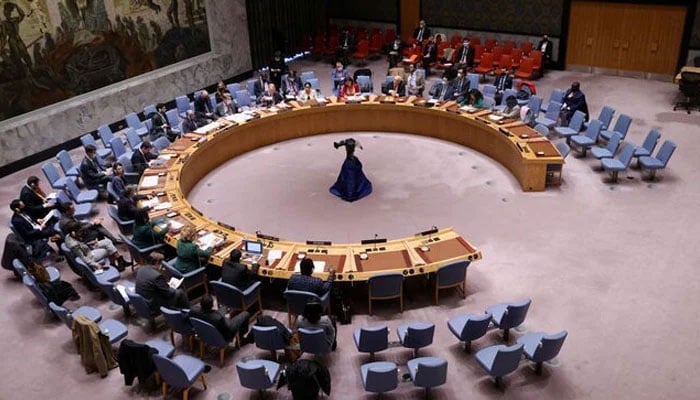UNSC seat
Setting UNSC agenda may also offer Pakistan an opportunity to steer course of global politics at critical juncture
On the first day of 2025, Pakistan began its eighth term as a non-permanent member of the global order’s foremost political body: the United Nations Security Council. The UNSC is composed of five permanent members: the US, the UK, France, China and Russia and ten non-permanent members who are elected for two-year terms by the UN General Assembly, with five replaced each year. Pakistan’s latest stint in the UNSC will thus last until the end of 2026. While this is not by any stretch a long tenure and being a non-permanent member comes with plenty of limitations, the most prominent one being the lack of veto power, sitting on the most powerful body in world politics is nothing to scoff at. The council, which is tasked to maintain international peace and security, can make legally binding decisions and ahas the power to impose sanctions and authorise the use of force against states. Simply put, the world can’t act in concert without the approval of the UNSC. During its current term, Pakistan will preside over the 15-member Council in July when it assumes the UNSC presidency, which rotates based on the alphabetical order of the member states’ official names, enabling it to set the agenda of the Council. The country will also get a seat on the Islamic State (ISIS) and Al Qaeda Sanctions Committee, which is responsible for designating individuals and groups as terrorists and imposing sanctions.
These are undoubtedly important appointments, particularly when it comes to the latter given that Pakistan has often been on the receiving end of terror financing restrictions. The country has fallen onto the ‘increased monitoring’ or ‘grey list’ of the Financial Action Task Force (FATF) three times, most recently from 2018 to October 2022. Setting the UNSC agenda may also offer Pakistan an opportunity to steer the course of global politics at a critical juncture where the old West-centric model appears to be breaking down. Pakistan’s alternate permanent representative to the UN has stressed that the country “will always remain a strong voice for peoples under foreign occupation and oppression and for the realisation of their right to self-determination”. He also reiterated that the country’s stance on Kashmir is rooted in UN resolutions and highlighted the nation’s commitment to a peaceful and stable Afghanistan.
Cynics will point out that Pakistan’s latest term on the UNSC is unlikely to change much and that the global order, as it stands, is rigged to favour the Western countries. Indeed, the breakdown of the five permanent members harkens back to a bygone era and the arrangement seems more suited to the cold war era. However, having the power and opportunity to give some more limelight to the issues affecting Pakistan and countries in the Global South should not be dismissed. That the world order is systematically unjust against poorer countries is not lost on anyone who follows global news, but that does not mean countries should simply give up on highlighting this fact and fighting for any bit of progress they can make. Centring the global discourse on new agendas is a chance to keep countries like Pakistan and their problems in the spotlight, and while that may not be a solution in itself, staying in the dark helps no one.
-
 Panthers Vs Islanders: Dmitry Kulikov Returns From Injured Reserve As Schwindt Hits IR
Panthers Vs Islanders: Dmitry Kulikov Returns From Injured Reserve As Schwindt Hits IR -
 SAG-AFTRA Drops SAG Awards Name To Rebrand
SAG-AFTRA Drops SAG Awards Name To Rebrand -
 Next Full Moon: How To Watch The Total Lunar Eclipse On March 3
Next Full Moon: How To Watch The Total Lunar Eclipse On March 3 -
 Bhad Bhabie Shares Tender Moment With Daughter Amid Cancer Setback Hint
Bhad Bhabie Shares Tender Moment With Daughter Amid Cancer Setback Hint -
 Silver, Gold Prices Surge Amid Geopolitical Uncertainty After US-Israel Attack On Iran
Silver, Gold Prices Surge Amid Geopolitical Uncertainty After US-Israel Attack On Iran -
 Britain To Trial Social Media Ban For Hundreds Of Thousands Of Children Under-16
Britain To Trial Social Media Ban For Hundreds Of Thousands Of Children Under-16 -
 Prince Harry Should Face Same Fate As Shamed Andrew, Says Expert
Prince Harry Should Face Same Fate As Shamed Andrew, Says Expert -
 Oil Price Jumps, Stocks Fall After US And Israel Strike Iran
Oil Price Jumps, Stocks Fall After US And Israel Strike Iran -
 Demi Lovato Admits Younger Self 'would Never Believe' Her Life Now: 'It Can Get Better'
Demi Lovato Admits Younger Self 'would Never Believe' Her Life Now: 'It Can Get Better' -
 Gunman Identified After Texas Bar Shooting Leaves 3 Dead, 14 Injured
Gunman Identified After Texas Bar Shooting Leaves 3 Dead, 14 Injured -
 Meghan Markle Was Bad Mouthed By Royals On King Charles Coronation
Meghan Markle Was Bad Mouthed By Royals On King Charles Coronation -
 'Bridgerton' Season 4: Showrunner Talks About Violet's Steamy Romance
'Bridgerton' Season 4: Showrunner Talks About Violet's Steamy Romance -
 John Tesh Recalls ‘uncomfortable’ Backlash Over ’70s Romance With Oprah Winfrey
John Tesh Recalls ‘uncomfortable’ Backlash Over ’70s Romance With Oprah Winfrey -
 Meghan Markle, Prince Harry Problem Was Not ‘work’ During Time With Royals
Meghan Markle, Prince Harry Problem Was Not ‘work’ During Time With Royals -
 Meta Strikes Multi-billion-dollar AI Chip Deal With Google: Will The New Collaboration Pay Off?
Meta Strikes Multi-billion-dollar AI Chip Deal With Google: Will The New Collaboration Pay Off? -
 Gracie Abrams Breaks Silence After Losing 2026 BRIT Award
Gracie Abrams Breaks Silence After Losing 2026 BRIT Award




